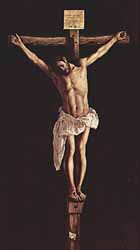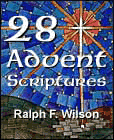
|
Old Testament
New Testament
Gospels
Acts
Paul's Letters
General Letters
Revelation
Topical Studies
Beginning the Journey (for new Christians). en Español

|
Old Testament
New Testament
Gospels
Acts
Paul's Letters
General Letters
Revelation
Topical Studies

|
Home
Bible Studies
Articles
Books
Podcasts
Search
Menu
Donate
About Us
Contact Us
FAQ
Sitemap
Day 27. The Suffering Servant (Matthew 1:21; Isaiah 53:4-6)
Friday (following the Fourth Sunday in Advent)
 Francisco Zurbarán (Spanish painter, 1598-1664), 'The Crucifixion' (1627), oil on canvas (114-5/16 x 65-3/16 in), The Art Institute of Chicago. |
Read in your Bible Isaiah 52:12-53:12
Jesus' core mission was salvation from sin.231 Before his birth the angel told Joseph:
"You are to give him the name Jesus,
because he will save his people from their sins."
(Matthew 1:21)
Jesus fulfilled this mission on the cross. Peter put it succinctly:
"He himself bore our sins in his body on the
tree."
(1 Peter 2:24a)
To explore this we turn to the amazing prophecy of the Suffering Servant in Isaiah. This passage is central to a New Testament understanding of the cross! Here, we'll look at only a few verses, but I refer you to where I have written extensively on this passage elsewhere.232 This passage is powerful! In fact, public reading of Isaiah 53 was banned in synagogues for a time because too many Jews saw in it the reference to Christ's death on the cross and so converted to Christianity.
Stricken by God (Isaiah 53:4)
Isaiah introduces the Suffering Servant as one who is "despised and rejected by men." Indeed, he was rejected by the leaders of his own people, beat mercilessly, then crucified in the most exquisite torture that the Romans could devise. At the foot of the cross his enemies mocked him. Little did they know what was happening there on Golgotha -- a divine redemption was taking place that shook the heavenly realms.
"Surely he
took up our infirmities
and carried our sorrows." (Isaiah 53:4a)
The Hebrew words that translate "took up" and "bore", "carried" are used of sacrifices and scapegoats bearing the guilt or punishment of sin,233 of bearing it away,234 of carrying a heavy load.235
Sins are referred to in figurative terms -- "infirmities" or "griefs"236 and "sorrows" or "diseases"237 (depending on how you translate it).238 One of those words suggests mental anguish,239 the whole sad story of the human race, the pain and suffering caused by sin and death, by wrong choices and out-and-out rebellion -- all these were on Jesus that day on the cross.
But all the time Jesus is suffering on our behalf, carrying our sins, he is understood by his enemies as bearing a just punishment from God for blasphemy.
"Yet we considered him stricken240
by God,
smitten241
by him, and afflicted."242
(Isaiah 53:4b)
No matter whether his crucifixion was misunderstood -- or not understood at all -- Jesus went through with it for us, willing to drink the cup necessary for our salvation.
Pierced for Our Transgressions (Isaiah 53:5-6)
Isaiah makes it clear, however, that this wasn't punishment for his own sin, but that he was taking our punishment for sin upon him.
"But he was pierced243
for our transgressions,
he was crushed244
for our iniquities;
the punishment245
that brought us peace was upon him,
and by his wounds246
we are healed." (Isaiah 53:5)
Just as the sacrifice of a lamb or goat or heifer was sacrificed as a substitute for the sinner under the Mosaic Law, so Jesus becomes "the Lamb of God who takes away the sin of the world" (John 1:29). In each of the four lines of verse 5, Isaiah makes it clear that his death is to bring us forgiveness and peace. The result of Jesus' suffering for us is expressed in two words -- peace and healing.
"Peace" is Hebrew shālôm. "The general meaning behind the root sh-l-m is of completion and fulfillment -- of entering into a state of wholeness and unity, a restored relationship," encompassing the ideas of "peace, prosperity, well[ness], health, completeness, safety."247 Whereas we once were in a state of enmity with God because of our selfishness, rebelliousness, and sin, now Jesus, the Prince of Peace, has forged a state of peace by removing our sins from us and taking them on himself.
"Healed" is Hebrew rāpā', "heal, make healthful," often used figuratively of healing and forgiveness.248 We are essentially broken. We have a fatal flaw, sometimes referred to as "original sin," or some such. We can improve morally, but then we fall again. Until we recognize our essential brokenness, we can't really move toward healing. Long ago, the 12-Step Program for recovering alcoholics and addicts of various sorts came to this conclusion, encapsulated into the first two steps towards recovery and healing.
Step 1. We admitted we were powerless over alcohol -- that our lives had become unmanageable.
Step 2. Came to believe that a power greater than ourselves could restore us to sanity.
We humans so resist this. I'm not so bad, surely better than most people. I can heal myself. We imagine that we can halt sin in its tracks through force of will. And yes, for a time, we might succeed outwardly. But the inner person -- that's another matter. Dear friends, we can't heal ourselves. We need Jesus to heal us and make us whole, and then gradually teach us to walk in his Way. The old African-American spiritual puts it this way:
"There is a balm in Gilead,
that makes the wounded whole.
There is a balm in Gilead,
to heal the sin-sick soul."
To make sure we understand this, Isaiah summarizes in different words.
"We all, like sheep, have gone astray,
each of us has turned to his own way;
and the LORD has laid on him the iniquity of us all." (Isaiah 53:6)
Our iniquity249 -- yes, that's a harsh word, but accurate -- has been laid250 on Jesus!
Christmas and the Cross
This is what the Christmas angel told to Joseph:
"You are to give him the name Jesus,
because he will save his people from their sins."
(Matthew 1:21)
 Also available in book formats: PDF, Kindle, and paperback. |
Without the cross, Christmas is the charming story of a baby boy born into poverty, birthed in a stable, but who rose to greatness -- a great Teacher and Martyr. From poverty to power. Bravo! But only as we understand the cross, do we realize that Jesus' most essential role for us is as Savior, the Suffering Servant who saves his people -- you and me -- from our sins.
Prayer
Thank you, Lamb of God, for laying down your life for your friends. For taking our sins upon yourself so that we might not have to bear the punishment. Thank you for redeeming us, for setting us free! Thank you, Jesus, for saving your people from their sins. Amen!
Discussion Question
Q27. (Matthew 1:21; Isaiah 53:4-6) In what sense has
Jesus saved his people from their sins? What does Isaiah 53:6 teach us about
how Jesus saved us from our sins? In what way is Jesus like a sacrifice for
sins?
https://www.joyfulheart.com/forums/topic/2102-q27-cross/
Endnotes
[231] Matthew 20:28; 1 Timothy 1:15; Luke 5:32: Luke 19:10; John 1:29; 3:16; 1 John 3:5; etc.
[232] "The Suffering Servant (Isaiah 52:13-53:12)" in Isaiah: Discipleship Lessons from the Fifth Gospel (https://www.jesuswalk.com/isaiah/09_suffering.htm).
[233] Nāśā', "lift, carry, take" (Walter C. Kaiser, nāśā', TWOT #1421. Young, Isaiah 3:345 and fn. 14). Genesis 4:13; Leviticus 5:1, 17; 7:18; Numbers 5:31; 14:34; Leviticus 10:17; 16:22.
[234] Exodus 34:7; Numbers 14:18; Micah 7:18; Psalm 32:1, 5).
[235] Sābal, "bear, transport (such as a heavy load)" (R.D. Patterson, sābal, TWOT #1458).
[236] "Griefs" (ESV, KJV), "infirmities" (NIV, NRSV) is ḥolî, "sickness, disease, illness," from ḥālâ, "to be or become sick, weak, diseased, grieved, sorry, etc." (Carl Philip Weber, TWOT #655a); "illness" (Holladay, p. 105).
[237] "Sorrows" (ESV, NIV, KJV), "diseases" (NRSV) is makʾōb, "sorrow," from kāʾab, "be sore, have pain, be sorrowful." Although the root can be used to express physical suffering, it much more commonly has to do with mental anguish (John N. Oswalt, TWOT #940b); "pain" (Holladay, p. 193).
[238] Matthew references this verse to observe that Jesus heals physical ailments also (Matthew 8:17), as he does today. Whether this means there is "healing in the atonement" is another issue.
[239] Makʾōb.
[240] "Stricken" (derived from our noun "strike") is nāga', "touch, reach, strike." The essential idea is "to touch," here in a negative sense, a physical blow (TWOT #1293).
[241] Hebrew verb nākâ, "smite, strike, hit, beat, slay, kill." Sometimes God is the subject of nākâ, bringing judgment (Marvin R. Wilson, nākâ, TWOT #1364).
[242] Hebrew verb 'ānâ, The primary meaning is "to force," or "to try to force submission," and "to punish or inflict pain upon" (Leonard J. Coppes, 'ānâ, TWOT #1652).
[243] Hebrew verb chālal, "wound (fatally), bore through, pierce" (Donald J. Wiseman, chālal, TWOT #660. Young, Isaiah 3:347 fn. 20).
[244] Hebrew verb dākā' means "be crushed, contrite, broken." God crushes the oppressor (Psalm 72:4) and the wicked (Job 34:25), but not the prisoner (Lamentations 3:34). (Herbert Wolf, dākā, TWOT #427). Young, Isaiah 3:347 fn. 21, "crushed, broken in pieces, shattered."
[245] "Punishment" (NIV, NRSV), "chastisement" (ESV, KJV) is mûsār, "discipline," or "correction which results in education" (Paul R. Gilchrist, TWOT #877b). Gilchrist (mûsār, TWOT #877b) sees Isaiah 53:5 in the context of substitutionary atonement, with the Servant taking "the severe punishment" vicariously.
[246] Hebrew noun chabbûrâ, "stripe, blow, stroke" (Gerard van Groningen, chābar, TWOT #598g. BDB 289). This relatively rare word is also used in Genesis 4:23; Exodus 21:25, Isaiah 1:6; Psalm 38:6; Proverbs 20:30. A related noun chăbarbūrâ refers to the stripes on a panther (Jeremiah 13:23). NRSV renders Isaiah 53:5 as "bruises."
[247] G. Lloyd Carr, shālôm, TWOT #2401a.
[248] See Exodus 15:26; Deuteronomy 32:39; Isaiah 6:10;19:22; 57:18-19; Hosea 6:1; 7:1; 11:3; Jeremiah 3:22; 8:22; 30:17; 33:6; Psalm 6:2; 30:2; 103:3; 2 Chronicles 7:14; 30:20 (William White, rāpā, TWOT #2196). The root seems to mean "repair by stitching, darn, mend" (BDB 950-951).
[249] "Iniquity" (all except NJB which has "rebellion") is ʿāwōn, "iniquity, guilt, punishment," then, "infraction, crooked behavior, perversion, iniquity, etc.", from the root ʿāwâ, "bend, twist, distort." (Carl Schultz, TWOT #1577a).
[250] "Laid" is the Hiphil perfect of pāgaʿ, "to lay a burden" (Victor P. Hamilton, TWOT #1731).
Copyright © 2026, Ralph F. Wilson. <pastor![]() joyfulheart.com> All rights reserved. A single copy of this article is free. Do not put this on a website. See legal, copyright, and reprint information.
joyfulheart.com> All rights reserved. A single copy of this article is free. Do not put this on a website. See legal, copyright, and reprint information.

